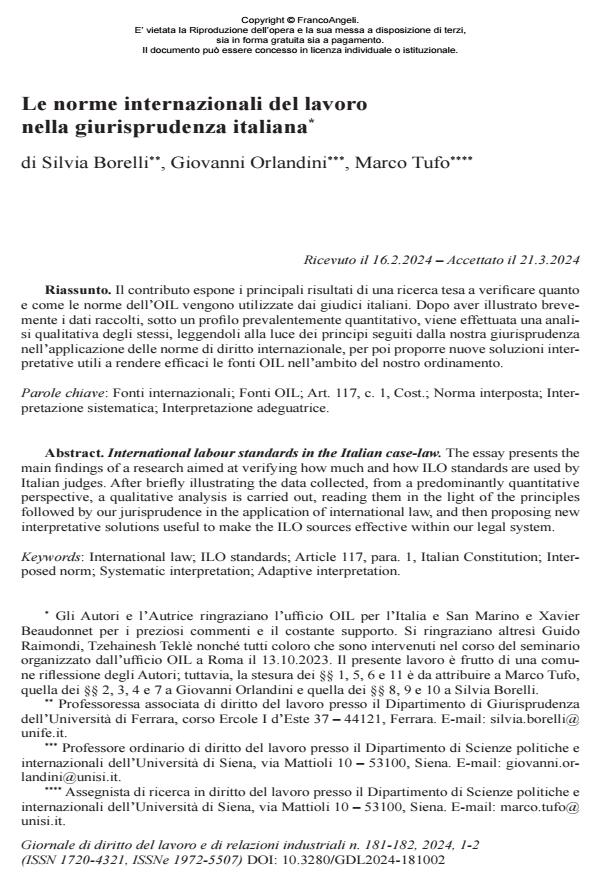International labour standards in the Italian case-law.
Journal title GIORNALE DI DIRITTO DEL LAVORO E DI RELAZIONI INDUSTRIALI
Author/s Silvia Borelli, Giovanni Orlandini, Marco Tufo
Publishing Year 2024 Issue 2024/181-182
Language Italian Pages 27 P. 33-59 File size 773 KB
DOI 10.3280/GDL2024-181002
DOI is like a bar code for intellectual property: to have more infomation
click here
Below, you can see the article first page
If you want to buy this article in PDF format, you can do it, following the instructions to buy download credits

FrancoAngeli is member of Publishers International Linking Association, Inc (PILA), a not-for-profit association which run the CrossRef service enabling links to and from online scholarly content.
The essay presents the main findings of a research aimed at verifying how much and how ILO standards are used by Italian judges. After briefly illustrating the data collected, from a predominantly quantitative perspective, a qualitative analysis is carried out, reading them in the light of the principles followed by our jurisprudence in the application of international law, and then proposing new interpretative solutions useful to make the ILO sources effective within our legal system.
Keywords: International law; ILO standards; Article 117, para. 1, Italian Constitution; Inter- posed norm; Systematic interpretation; Adaptive interpretation.
- Amoroso G. (1998). L’interpretazione “adeguatrice” nella giurisprudenza costituzionale tra canone ermeneutico e tecnica di sindacato di costituzionalità. FI: 89 ss.
- Beaudonnet X., Teklè T. (2015). International labour law and domestic law: a training ma- nual for judges, lawyers and legal educators. Torino: ILO International Training Center.
- Beaudonnet X. (2016). Quelques observations sur l’utilisation des normes de l’Organisation internationale du Travail par les tribunaux nationaux. RDCTSS: 116 ss.
- Beaudonnet X. (2019), Quelques observations sur l’utilisation des normes de l’OIT par les tribunaux nationaux. In: Politakis G., Kohiyama T., Lieby T. (eds.), ILO100 – Law for Social Justice. Genève: BIT, 745 ss.
- Bin R. (2015). L’interpretazione conforme. Due o tre cose che so di lei. In: Bernardi A. (a cura di), L’interpretazione conforme al diritto UE. Profili e limiti di un vincolo problematico, Napoli: Jovene, 17 ss. Bin R. (2018). Critica della teoria dei diritti. Milano: FrancoAngeli. Bin R. (2019). Critica della teoria delle fonti. Milano: FrancoAngeli.
- Bin R., Pitruzzella G. (2023). Diritto costituzionale. Torino: Giappichelli.
- Borelli S., Orlandini G., Tufo M. (2024). Le norme internazionali del lavoro nella giurispru- denza italiana. Roma: Ufficio OIL per l’Italia e San Marino.
- Borlini L., Crema L. (2018). Il valore delle pronunce del Comitato europeo dei diritti so- ciali ai fini dell’interpretazione della Carta sociale europea nel diritto internazionale. FQC: 86 ss.
- Caruso C. (2019). Controllo di convenzionalità e interpretazione conforme: il ruolo del giu- dice nazionale. QG.
- Conforti B. (2006). Diritto internazionale. Napoli: Editoriale Scientifica.
- Ferrante V. (2020). L’Italia e l’OIL. In: Id. (a cura di), A tutela della prosperità di tutti. L’Italia e l’organizzazione internazionale del lavoro a un secolo dalla sua istituzione. Milano: Giuffrè.
- Forlati S. (2018). Corte Costituzionale e controllo internazionale: quale ruolo per la “giuri- sprudenza” del Comitato europeo per i diritti sociali nel giudizio di costituzionalità delle leggi? FQC: 67 ss.
- Forlati S. (2019). Corte costituzionale e decisioni del Comitato europeo dei diritti sociali. LD; 597 ss.
- Forlati S. (2020). Interpretazione giudiziale e sviluppo del diritto internazionale. AI: 51 ss. Guastini R. (2004). L’interpretazione dei documenti normativi. Milano: Giuffré.
- Guastini R. (2011). Interpretare e argomentare. In: Schlesinger P. (diretto da), Trattato di diritto civile e commerciale. Milano: Giuffrè.
- ILO (2021). Addendum to the 2020 Report of the Committee of Experts on the application of Conventions and Recommendations, Report III/Addendum (Part A). Geneva: International Labour Office.
- ILO (2022). Collaboration with the United Nations. Extracts from the General report of the 2022 Report of the Committee of Experts on the Application of Conventions and Recommendations. Geneva: International Labour Office.
- Mantouvalou V. (2012). Are Labour Rights Human Rights? ELLJ: 151 ss. Ruotolo M. (2018), Quando il giudice deve “fare da sé”. QG.
- Salerno F. (2018). La coerenza dell’ordinamento interno ai trattati internazionali in ragione della Costituzione e della loro diversa natura. Testo disponibile al sito: www.osservatorio- sullefonti.it (consultato il 7.2.2024).
- Teklè T. (2017). Utilisation des normes de l’OIT par les juridictions nationales: comment et pourquoi? DO: 414 ss.
- Teklè T. (2018). Labour Rights and the Case Law of the European Court of Justice: What Role for International Labour Standards? ELLJ: 236 ss.
- Teklè T. (2020). The Contribution of the ILO’s International Labour Standards System to the European Court of Human Rights’ Jurisprudence in the Field of Non-Discrimination. ILJ: 86 ss.
- Thomas C., Oelz M., Beaudonnet X. (2004). The Use of International Labour Law in Domestic Courts: Theory, Recent Jurisprudence, and Practical Implications. In Javillier J.C., Gernigon B. (a cura di), Les normes internationales du travail: un patrimoine pour Silvia Borelli, Giovanni Orlandini, Marco Tufo 59 l’avenir. Mélanges en l’honneur de Nicolas Valticos. Geneva: Bureau international du travail, 249 ss.
- UN Economic and Social Council (2005). General comment No. 18 (2005) on the right to work of the Committee on the economic, social and cultural rights. Geneva, 7-25 November 2005.
- UN Economic and Social Council (2016). General comment No. 23 (2016) on the right to just and favourable conditions of work. 27 April 2016.
- Le norme internazionali del lavoro nella giurisprudenza italiana Silvia Borelli, Giovanni Orlandini, Marco Tufo, in GIORNALE DI DIRITTO DEL LAVORO E DI RELAZIONI INDUSTRIALI 181/2024 pp.33
DOI: 10.3280/GDL2024-181002 - Licenziamento e norme internazionali: la recente giurisprudenza spagnola Juan Bautista Vivero Serrano, in GIORNALE DI DIRITTO DEL LAVORO E DI RELAZIONI INDUSTRIALI 186/2025 pp.235
DOI: 10.3280/GDL2025-186002
Silvia Borelli, Giovanni Orlandini, Marco Tufo, Le norme internazionali del lavoro nella giurisprudenza italiana in "GIORNALE DI DIRITTO DEL LAVORO E DI RELAZIONI INDUSTRIALI " 181-182/2024, pp 33-59, DOI: 10.3280/GDL2024-181002